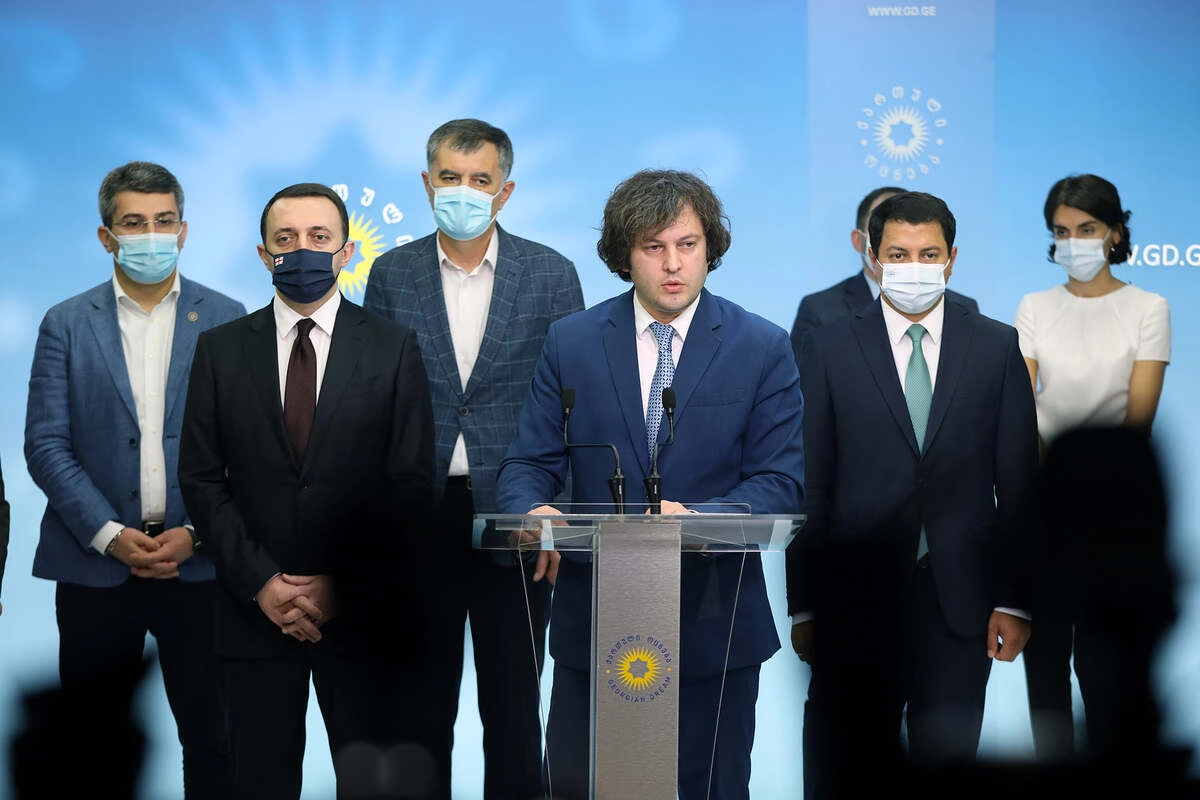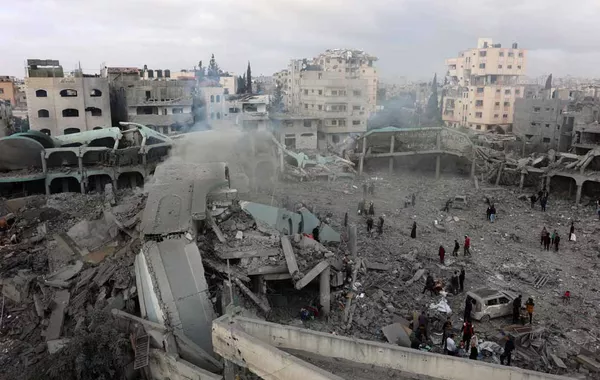
Demonstrations, boycotts, EU mediation and new electoral systems: is Georgia experiencing dangerous polarisation or just the rough and tumble of an evolving democracy?
Georgians protest in front of the Parliament of Georgia after elections, Nov 8 2020. Image: Tai Dundua/Shutterstock
Politics in Georgia are certainly not dull. Passions run high, and large public demonstrations have been popular outlets for dissent since the 2003 Rose Revolution. Recent outcries over the brutal suppression of Tbilisi Pride are just the latest turn in a dynamic political process that can seem chaotic and polarised to outsiders but whose hearty urge for expression can also be seen as a healthy foundation for a steadily maturing democracy.
Despite its rich history, including a glorious ‘golden age’ in the 12th century, Georgia is young as a modern nation-state. It gained independence in 1991 after 200 years of Russian/Soviet occupation and, since then, the country has faced a series of struggles to consolidate democracy. This is not uncommon in post-Soviet republics making a transition away from “peoples’ authoritarianism.” A particular ‘dilemma of new democracies’ outlined by geopolitical theorist Samuel Huntington has been called the ‘Torturer Problem’: whether to prosecute and punish or rather to forgive and forget the crimes committed by previous governments. While such dilemmas are becoming more of a concern even in mature ‘Western’ democracies, the problem is more significant in transitioning states where trust in law enforcement agencies and the judiciary is low. For example, a public opinion poll by the NDI [1] shows that only 43% of Georgian interviewees positively evaluate their court system’s performance. Moreover, the ruling party for nearly a decade, Georgian Dream (GD), further undermined public faith in the legal process in February 2021 when it detained Nika Melia, chairman of the UNM [2], the country’s most significant opposition party. Melia’s ‘crimes’ dated back to 2019 when he was part of a major demonstration following the so-called Gavrilov Affair, which kicked off the current period of semi-constant political ‘crisis.’
On June 20, 2019, Russian MP Sergei Gavrilov addressed the Georgian parliament. Outwardly this was simply a part of the Interparliamentary Assembly on Orthodoxy, an annual congress bringing together lawmakers from countries with significant Orthodox Christian populations. However, the fact that Gavrilov spoke in the Russian language from the speaker’s chair was considered highly inflammatory by crowds of Georgians. That’s because of Russia’s role as the brutal former colonial power, and especially its post-Soviet role in engineering conflicts that lead to the breakaway of Abkhazia and South Ossetia. Gavrilov himself had previously advocated Abkhazian independence and unsubstantiated rumours insinuated that he might even have fought in the 2008 Abkhazian conflict. This compounded mounting unrest amongst the angry crowd who gathered in front of the Georgian parliament. Police fought off demonstrators who tried to storm the building, leaving some 240 people hurt - several severely, including two with eyes lost to rubber bullets. That night was followed-up with months of demonstrations by civilians demanding the resignation of the Prime Minister and the Minister of Internal Affairs.
In the run-up to November 2020’s parliamentary elections, radicalization between political parties continued to grow, and it looked as if Georgian democracy was taking a backwards step. These fears were reinforced after the results were announced. Most observers accepted that ruling party GD had won, thanks in part to their positive handling of the Covid-19 pandemic. However, major opposition parties refused to recognize the results, claiming that they were rigged.
Georgian President Salome Zourabichvili allowed that elections in the past few years hadn’t been perfect but suggested that any electoral violations were not significant enough to affect the outcome. Though in terms of votes, the polls had been fairly close, they had resulted in a ‘landslide’ majority for the ruling party, largely due to the somewhat unusual Georgian electoral system. Changing the system became a campaigning issue in its own right while opposition parties collectively decided to boycott the election results by refusing to send their MPs to parliament. Then came Nika Melia’s arrest.
Melia’s dramatic detention in February 2021 was a TV spectacle that saw the opposition leader bundled out of his party’s office after it had been stormed by a heavy-handed police action. The raid, organized by the prosecutor’s office, had been well known in advance to parliamentarians. Its planned implementation led to a wave of pre-emptive resignations by politicians unwilling to be associated with the move. Most significant amongst those stepping aside was the GD’s own Prime Minister, Giorgi Gakharia, who promptly started his own political grouping. Other parties also fractured: Grigol Vashadze left the UNM of which he’d been chairperson, Davit Bakradze departed the European Georgia and libertarian party, “Girchi,” split into two groups. This confusing reshaping of Georgian politics still failed to achieve consensus over the legitimacy of the election. Meanwhile, EU and US ambassadors initially drew a blank when petitioning for the release of Melia and fellow ‘political prisoner’ Giorgi Rurua (founder of an opposition TV station). They did, however, make some progress in finding a compromise on electoral reform, as we shall see later.
Georgia’s significance to the European Union has grown considerably since signing an association agreement in 2014, and all major political parties are essentially pro-European. So, despite the apparent crisis in Tbilisi, in January 2021, President Salome Zourabishvili visited Brussels to push home the message that the country wants to apply for EU membership in 2024. Here the European Council President, Charles Michel, described the EU’s support for Georgia as “unwavering.” Although at the time he was referring specifically to the long-term border conflicts with Russia, this seemed to have triggered a similar sense of urgency at helping to mediate a solution to Georgia’s political log jam.
Michel visited Georgia and met with both camps and, through personal envoy Christian Danielsson, presented a compromise deal spelling out detailed roadmaps to address both electoral reform and politicized perceptions of the justice system. Key points included moves to restart cross-party parliamentary dialogue, suggestions for reforms of the judiciary system and demands for the release of individuals jailed over the Gavrilov Affair demonstrations - notably, if not specifically, including Nika Melia. The Michel deal was accepted and signed by Georgian Dream, and Melia was released. After several so-called “cosmetic amendments,” many other opposition parties were also ready to sign. But although returning their members to sit in parliament, according to the spirit of the agreement, the UNM – along with some other parties (Labour Party, European Georgia) – still refused to actually sign the Michel deal. According to Georgian Dream, this stance is simply unhelpful in defusing the polarisation of Georgian politics – as

One of the key changes that has been settled through EU mediation is a change in the country’s electoral system. For years, Georgia has used a “mixed model,” electing 73 members of parliament by majoritarian vote (50% plus one vote) plus another 77 through proportional representation. However, such a system tends to amplify the number of seats won by the biggest party. For example, look at the results of the 2016 Parliamentary Elections. In that poll, Georgian Dream garnered the highest vote share at 48.68%, but this gave them a disproportionate 115 of the 150 seats in parliament (44 by proportional vote, plus 71 in first-past-the-post constituencies). While such forms of amplification are by no means uncommon – the UK’s system is arguably far more warped – there is an understandable feeling amongst opposition parties that this gives too much power to the victor.
Originally the mixed system was due to be changed for the general elections of 2012 general elections. However, the UNM, which was then the ruling party, postponed the changes to 2016. Georgian Dream’s founder, Bidzina Ivanishvili, had promised a fully-proportional electoral model. Yet, when coming to power, in what proved one of the first significant conflicts between GD and the so-called ‘united opposition,’ GD themselves postponed the changes as several members of the party voted against this initiative. For the 2020 elections, a compromise was hammered out, facilitated by the US and EU ambassadors, reducing to just 30 seats the MPs elected in majoritarian constituency races. Officially Georgia’s parliamentary elections are now set to move to a fully-proportional model in 2024, with a 2% threshold for representation – an important figure given Georgia’s remarkable plethora of political parties. Also, while opposition demands for a ‘snap election’ post-2020 were not granted, the October 2021 local government elections will be the most important in recent history. If the ruling party polls below 43%, then the 2024 general election will have to be brought forward to 2022. A ‘semi-snap’ election, if you will.
Recent opinion polls by IPSOS and Edison Research (on behalf of opposition TV channels Mtavari Arkhi and Formula, respectively) suggest that Georgian Dream’s poll ratings are currently hovering around 34%. The statistics suggest that UNM maintains its position as the main opposition party, with former Prime Minister Gakharia’s party, “For Georgia,” emerging as a third major player in Georgian politics, helped in part by his resignation over the Melia affair. Although opinion polls never give an entirely accurate picture, it looks unlikely that any single party will be able to secure the 43% of the vote required to avoid triggering early parliamentary elections in 2022. Even if GD did top 43% at the local elections, that would still far from guarantee their gaining an overall majority in 2024. Indeed, under a fully-proportional model like those of most western European nations, overall majorities are almost unthinkable. To many, that is exactly the hope – that the need to form coalition governments will lead to reduced political polarisation and a more inclusive attitude in parliament. Let’s hope so.
[1] National Democratic Institute (a US-based international NGO, working worldwide to strengthen and safeguard democratic institutions)
[2] United National Movement (the party with which Mikheil Saakashvili came to power in the Rose Revolution of 2003 and which itself ruled until 2012)
Share on social media
